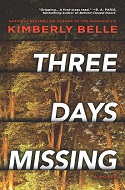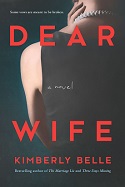 Synopsis:
Synopsis:
Jade and Cam Lasky are by all accounts a happily married couple with two adorably precocious kids, a spacious showcase home, and a rapidly expanding restaurant business. But their world is tipped upside down when Jade is confronted by a masked home invader.
As Cam scrambles to gather the ransom money, Jade starts to wonder if they’re as financially secure as their lifestyle suggests . . . and what other secrets her husband is keeping from her.
Cam may be a good father, a celebrity chef, and a darling husband. But there is indeed another side he’s kept hidden from Jade. And now their family is in danger. Unbeknownst to Cam and Jade, the home invader has been watching them and is about to turn their family secrets into a public scandal.
Everyone is about to know what her husband isn’t telling her . . .
Review:

Bestselling author Kimberly Belle grew up in Kingsport, Tennessee and studied at Agnes Scott College, a liberal arts institution for women in Atlanta, Georgia. From there, she loved living in the Netherlands for twelve years, and still divides her time between there and Atlanta. She readily admits that she has been blessed with “a charmed life. I grew up solidly middle class, in a nice home with two loving parents and a slew of beloved pets. I am college educated, financially comfortable, a happily married mother to two healthy children who’ve grown into kind and thriving adults.”
But she pens what she calls “really dark stories” because she lives in the real world where bad things happen to good people who are in the wrong place at the wrong time, instantly turning “the most charmed life upside down.” She says she is terrified of and fascinated by “how darkness can come for you without a second’s warning,” so through her writing, she examines “the shadows, so I can see what’s coming for me.”
But “being able to write about it, I can make the bad guys pay. I can write the story the way I want it to end and sort through my confusion and feelings” about horrible events. She relishes being able to “to serve up justice,” and even though her stories do not always have a neat, tidy ending, they are “always hopeful.”
Her books, including The Marriage Lie, Dear Wife, Three Days Missing, Stranger in the Lake, and her latest, My Darling Husband, typically focus on husband-wife relationships and domestic suspense. She believes marriage is an intimate and universally-understood relationship providing myriad directions she can steer a story in which the relationship goes sideways — for instance, one partner is betrayed, there are secrets and lies — and “that fascinates me.”
My Darling Husband is “a story rooted in truth.” A significant number of violent crimes occur in Atlanta every year, including many home invasion robberies and it happened to someone she knew. A woman found two armed strangers waiting for her in her garage when she came home. Holding her and her two young children at gunpoint, they forced their way into the residence and demanded “a very large and strangely specific ransom from her husband.” They tied her to a chair and broke her jaw. Eventually, she was able to escape and get help by flagging down a passing motorist. But it was not a random crime. “The ransom amount was a number they’d gotten off a bank statement pilfered from the mailbox,” according to Belle.
Belle says the ordeal that woman and other crime victims survived “wouldn’t leave me alone.” She asked herself, “What would I have done in that mother’s shoes? How far would I go to save my children?” Her musings provided the structure for Jade Lasky’s experiences in My Darling Husband.
There are few crimes more frightening than home invasions and Belle takes readers on a horrifyingly realistic journey with Jade, who, like Belle, is enjoying a pretty charmed life. She enjoyed a meaningful career designing offices and boutiques before marrying, but has used her skills and experience to create a beautiful home for her family and design the restaurants owned and operated by her handsome (“six and a half feet of big, Mediterranean man”), charismatic husband, Cam. A celebrated chef, Cam is known as Atlanta’s Steak King. Beatrix, their nine-year-old daughter is a sassy, energetic, and perfectionistic violin prodigy while Baxter is an adorable six-year-old. Cam has branched out, opening several restaurants, but the flagship store is critical to the enterprise’s financial survival.
At the story opens, Jade observes the same “skeevy” man dressed in all black with a distinctive “comb-over man bun” in the parking lot of Beatrix’s music school that she has previously seen at the gym and grocery store. She calls Cam to tell him that the man has appeared yet again, seemingly following her, and learns that there has been an electrical fire at the restaurant, caused by faulty wiring right next to a giant tub of cooking oil. When she asks Cam how bad the fire was, he responds, “On a scale of one to ten? Four hundred and fifty-seven.”
But Jade’s day is about to get much, much worse.
Belle employs a first-person narrative from Jade to relate her experiences. In terrifying detail, she describes pulling into her garage with the children in the car and finding a “black figure in the shadows.” Her first thought is, naturally, of her children. “This is parenthood in a nutshell: utter terror for your children’s welfare, always.” She quickly confirms that there is, in fact, “a man, looming in my garage. Breathing the same air.” He’s wearing a mask and wielding a gun. And from that point on, Belle takes readers on a hellish journey with Jade as she attempts to learn who the man is and why he has targeted her and her children. Things only become murkier when he orders her to call Cam and tell him to bring $734,296.00 in cash to the house
and not alert the police. The specific ransom demand is puzzling, and the man smiles when he instructs Jade to “‘tell your darling husband seven o’clock or else.’ Almost like a dare.”
Belle also relates Cam’s story via a first-person narrative that reveals how deeply Cam loves his wife and children. But Cam’s business dealings have been, unbeknownst to Jade, quite complicated. In fact, they are a dangerous house of cards that Cam feverishly tries to keep from collapsing as he frantically scurries about town trying to borrow money and liquidate assets in order to pay the ransom and save his family. Even as Belle deftly exposes Cam’s nefarious motives and affiliations, and downright despicable choices, she manages to endear him to readers by also examining the reasons for his actions, his emotional struggles, and acknowledgment of his mistakes. Cam is cornered and shamed, but he is committed to his family.
Easily the most effective literary technique used by Belle is her inclusion of alternating chapters detailing, in salient chunks, an interview of Cam being conducted by a local television reporter months after the home invasion. It is the first time Cam has spoken to the media and is occurring at his request because he has decided it is “time to set the record straight.” Belle cuts away from the interview to the aforementioned time-stamped narratives of Jade and Cam without revealing whether Jade and the children are still alive or if their assailant was captured, compelling the story forward in an almost cinematic manner. Interestingly, she drafted the entire book before deciding to add the chapters depicting the interview which she “thought . . . would make it a little more interesting.” It does.
My Darling Husband is a fast-paced, wholly believable thriller into which Belle injects shocking revelations at expertly-timed junctures. Her characters are fully developed and sympathetic — especially “the B’s,” Beatrix and Baxter, who quickly make their way into readers’ hearts and remain there for the duration. Jade is intelligent and resilient, and confronted with horrific, unimaginable choices. But she heroically remains observant and calculating as she works to outsmart her abductor. “Every hint he drops, every tiny tidbit he buries in a sentence he thinks I won’t notice . . . they’re all clues,” Jade notes. Belle’s story is cleverly plotted and scarily plausible. Once again, she explores a marital relationship with compassion and finesse, as readers ponder how many lies and deceptions it can sustain . . . assuming that Jade and her children survive.
Belle shares that writing a fictional tale inspired by actual crimes served as “both an outlet and a balm, because it’s allowed me to give [the victims’] experiences some meaning.” She thrives on giving her characters “the ending they deserve” and wants to hold up women who have been victims of violent crime as “the heroines they are and right the wrongs done to them. Even if their charmed lives did go up in proverbial smoke . . .”
Finding out if she gives Jade a just ending is a gripping and highly entertaining, but nerve-wracking experience. Once again, Belle proves her storytelling prowess by creating empathetic and credible characters who find themselves in ghastly, terrifying circumstances. Perhaps, as she observes, the moral of My Darling Husband is “to not take anything for granted. . . . [Because] the only truly charmed people are the ones that exist on the page.”
Excerpt from My Darling Husband
Jade
2:51 p.m.
I’m pulling into the Westmore Music Academy lot when I spot him, the man leaning against the building’s brick and carved concrete sign. Pocked skin. Black-rimmed glasses. Skinny shoulders hunched against the rain. Atlanta is getting plowed with the tail of a tropical storm stalled over the gulf, blasting soupy heat all the way up to Tennessee, and he’s wearing that same cracked leather coat like it’s January and not early Au- gust, his hands shoved deep in the pockets as if for warmth.
I gun it up the hill hard enough to make my tires squeal, tapping a button on the steering wheel. “Call Cam.”
While the call connects, I glance in my side mirror, trying to pick him out of the trees and shrubs.
The grocery store. The nail salon and yoga studio. Yesterday at Starbucks, he passed me a stevia packet before I could ask for one, which makes me wonder how many times he’s seen me there, stirring sweetener into my coconut latte.
Cam’s deep voice booms through the car speakers. “I’m in the middle of something. Can I call you in thirty?”
My husband always answers, even when he’s busy. Especially then. This is our steadfast rule ever since our oldest, Beatrix, took a spill on the playground when she was four, knocking herself out and breaking her arm in three places. Cam was in the middle of a renovation at the Inman Park restaurant at the time, covered in construction dust and arguing with contractors whose every other word was over. Overdue, overworked, over budget. Thirty times I called him that day, frantic and bouncing in the back of an ambulance while comforting a scared child and trying to keep a fussy toddler on my lap. Cam didn’t feel his phone buzzing in his back pocket, didn’t notice the screen lighting up with a long line of increasingly desperate messages from me.
The last one I left as they were wheeling Beatrix into Children’s Healthcare.
“Your daughter is in the hospital, Cam. Maybe pick up your phone and call us sometime.”
Mean and petty, I know, but I’ve never been so furious. Or so stressed. Or so downright petrified.
Beatrix was fine. Cam and I, however, lost five years of our lives that day.
Now I say to Cam, “He’s here.”
“Who’s where?”
“That guy. The skeevy one I told you about, with the glasses and the comb-over man bun. He’s here at Westmore.”
“Well, maybe he has a musically gifted kid.”
I roll my eyes, lift my hands from the steering wheel. “Right. And he just happens to go to the same gym as me and shops in the canned goods aisle at Whole Foods whenever I walk through their door.”
In the back seat, Baxter leans as far forward as his booster seat will allow. “Hi, Daddy!”
“Hey, buddy. You keeping your mom company?”
Except for his fine mousy waves, our son is a spitting image of Cam. Baxter gives an enthusiastic nod. “She took me to Bruster’s, and then she made me get the frozen banana.”
And he’s still salty about it, too, no matter how many times I explain that food coloring is bad for his six-year-old body, and the scoop of Purple Dinosaur he’s constantly begging for is more dye than ice cream. The banana dipped in dark choc- olate is our hard-won compromise.
I twist around on my seat and hold a finger to my lips, my next words for Cam: “Of course he doesn’t have a musically gifted kid. I’m telling you, Cam. This guy is following me. He is.”
“Who is?” Baxter says, looking out the back window. “Who, Mommy?”
I ignore him and check my mirrors, all of them, but the man is gone. The line of parked cars, the hill between here and the busy road, he’s nowhere. Even if I could see the sign from where I’m sitting, there are dozens of people on this stretch of street, pedestrians and runners, employees popping out for fresh air or to the nearby sandwich shops, people socializing on the covered benches. If he’s still down there, it would be easy to conceal himself in the crowd.
And yet he made sure I saw him when I was turning into the lot, didn’t he? The way he was dressed in all black like some kind of daytime cat burglar, how his shoulders straightened and his head popped up when he spotted my car, how he stared at me through the windshield like he was daring me to see him. Like he wanted me to see him and be scared. Maybe that’s why he’s been following me for days.
I gasp as something occurs to me. “Omigod, Cam. What if it’s not me he’s after, but the K-I-D-S? What if that’s why he’s been following me all over creation, because he’s trying to get to them?”
“Why would he be after the kids?”
I cringe at the way he said the word, already dreading the conversation I’m going to have to have with Baxter later. “I don’t know. For ransom. For creepy shadiness I don’t want to say out loud because you’re on speaker phone. Plus, I don’t want to give it energy.”
“Saying the words…” Something clangs in the background, metal on heavy metal. Cam waits until the noise dies down. “Saying them out loud doesn’t bring something into existence, you know that as well as I do. And why would he be after the kids when there are a thousand other families in this city with fancier cars and bigger houses than ours? I mean, one look at our street and it’s clear there are plenty of bigger fish.”
“Yeah, but it’s your face on the cover of Atlanta Magazine.” When Cam walks into a place, everything tilts. Heads turn, bodies shift, gazes stick. Going to a restaurant with Atlanta’s Steak King is like dining out with a rock star. The waitstaff, the chef, the other patrons in the restaurant—they all come over to bask in Cam’s glow.
And Cam knows he’s visible, even without his chef’s gear. Thick black hair, a square jaw, straight white teeth he flashes often. My husband is handsome, but it’s the combination with his height that gets him noticed. Six and a half feet of big, Mediterranean man.
“Go talk to the building’s security guard. That’s what he’s there for.”
“And say what? That there was a strange man standing on the sidewalk? The road is public property.”
“True, but I’m sure the guard would want to know if one of their clients is being stalked. At least give him a description of the creep.”
I shiver, the reality of this conversation inching up the back of my neck. Maybe I’m wrong. Atlanta is a big city that can feel like a really small town. I run into people I know every- where. Maybe this is all some strange coincidence.
I rewind back to the first time I noticed him, a few days ago through the plate-glass window at Kale Me Crazy. There I was, seated alone at the bar with my phone and a smoothie I didn’t want, killing an empty hour between playdates and pickup times by scrolling through Pinterest. I was feeling sad and nostalgic for the offices and boutiques I used to design, back before I met Cam. This was before his name became eponymous with Atlanta’s high-end dining, before I came up with the sleek stone and metal look that would become a recognizable part of his brand, before I pushed out two babies in three years and closed up shop. But that day, I looked up and he was there, squinting into the sunshine and watching me.
A weirdo, but a random one, I assumed—until I spotted him later at the dry cleaner, at the deli across from my yoga studio, at the Starbucks and the canned goods aisle of the grocery store.
And now here he is again, today. At my child’s music school. My skin prickles with alarm.
“I’m sure it’s nothing, but next time you see this guy, point your phone at his face and tell him you’re streaming live to Twitter. If it doesn’t scare him off, you’ll at least have a visual to show the guard.”
His voice gets sucked up into more clanging, followed by a heavy crash and multiple voices, all of them shouting. I realize it’s been like this since the start, his voice pushing through loud and chaotic background noise.
“Babe, why does it sound like you’re at fight club?”
“I’m at the shop on Bolling Way. There was a fire.”
My stomach drops at his words. Bolling Way is Cam’s signature restaurant, a booming scene surrounded by Buckhead’s finest stores, a place that’s packed from noon until midnight.
“How bad was it?”
“On a scale of one to ten? Four hundred and fifty-seven.” He sighs, and it occurs to me that the concern I thought I heard in his voice wasn’t for me and the kids, but disaster at his most profitable restaurant. A torched Buckhead kitchen means a big, giant hole in our income. “I’m here with Flavio. We’re talking through our options.”
Flavio is the location’s general manager, and Cam’s highest paid employee.
I’m opening my mouth to respond when I spot the clock on the dash: 3:01. A whole minute late, and to pick up a child who loses her shit at the tiniest adjustment to her daily schedule. “Oh crap, gotta go. Call me later.”
I hang up, swipe my bag from the floor and Bax from the back seat, and race to the double glass doors of the building, looking over my shoulder the entire way.
I look for him after. Instead of turning left for home, I point my car right, steering past the spot where I saw him last, lean- ing against the sign. Four times I hold up traffic to search him out of the crowd, twice headed in the wrong direction, then two more times on the drive back past the building. I press my iPhone to the window and ride the brake the entire time, creeping by the entrance to the lot so slowly that more than one impatient driver honks.
But he’s not there. The patch of trampled grass by the sign is empty. The man-bunned man is gone.
Baxter pushes up in his booster seat, straining to see out the window. “Mommy, where are we going?”
“We’re going home.” I’m headed in the right direction, but my hunt took too long. Now we’re stuck in traffic.
“Then why do you keep turning around?”
“And why are you going so slow?” Beatrix adds before I can explain. She swipes a wet finger down the back window, pointing at two women speed walking past us. “Are you sure we’re not going backward?”
Beatrix knows we’re not going backward, but she enjoys being a smart-ass. Too clever for her nine years. Too sassy and energetic, too, and as tightly wound as the composite core strings on her DZ Strad violin — at least that’s according to her teachers.
And as much as I love my daughter, they’re not wrong. Beatrix has been a handful since the second she came into this world, bloodred and hopping mad. Colic. Sleeping is- sues. Sinewy muscles that hated to be swaddled. My pediatrician called her a high-needs baby, patted me on the shoulder and promised me most grow into normal, well-adjusted kids.
Something that for Beatrix will never happen.
My daughter is a musical genius, something I accidentally discovered when she was four, when after a quick dash through Fresh Market she hummed a perfectly pitched concerto all the way home. A few weeks later at Target, she picked out the melody with two chubby fingers on a keyboard, but it was the pink toy violin she begged to take home. Within a few months, I managed to find a teacher willing to give formal lessons to such a young student. The woman, a stern grand- motherly type, emerged from their first session pink-cheeked and throwing around the word, prodigy.
My Beatrix is special. Thanks to an accident of fate and chance and random genes, she will never grow into that normal child the pediatrician promised. She has this astonish- ing, one-in-a-million gift, but one that comes with an ear that hears her every mistake. A perfectionist with mile-high standards for herself, quick to become frustrated and anxious when her fingers don’t cooperate.
But when they do, it is magical.
I grab two packets of Goldfish from the glove compartment, then pass them to the back seat. We’re only a few miles from home, but I have learned to always come prepared. Juice boxes, snacks, iPads with every movie known to man. I’m not above parenting by distraction.
“Help Bax open his, will you?” I say to Beatrix, but I’m too late. They’re already playing tug-of-war with the bag.
“Give it to me. I can open it on my own.” Baxter kicks the back of my seat in protest.
“You can’t do it by yourself,” Beatrix says, her voice matter-of-fact. “You’re too little.”
“I’m not little! Give it here.” Baxter swipes at the bag, but his big sister is too strong. He can’t pry the packet from Beatrix’s fingers. “Mommy, Beatrix won’t give me my Goldfish. Make her give me my Goldfish!”
This happens hundreds of times a day, relentless bickering over anything, everything, nothing.
I take a deep, deep breath and try not to death-grip the steering wheel. How does this happen? How can it be that I spend every second my kids are out of sight missing them terribly, picturing their adorable little faces all day long, seeing their sweet smiles, imagining the feel of their bony arms around me, then I have them for ten minutes in the car and I’m counting the seconds until bedtime.
“Miss Juliet says you worked on a new piece.” I stuff my words with enthusiasm and smile into the rearview mirror, trying to catch Beatrix’s eye under those crazy white-blond curls, a cloud of a million tiny ringlets she wishes would lay flat like her brother’s.
The distraction works. Beatrix sighs and lets go of the crackers. “Yeah.”
“That’s great. Which one?”
“Fantaisie Impromptu. But I think I want to play the piano.”
I can’t help myself; I laugh. School starts in two weeks, and thanks to Miss Juliet’s nonnegotiable requirement for a minimum of three hours of daily practice, our schedules are al- ready packed. With Beatrix’s ear, she could probably pick up a new instrument quickly, but still. “When on earth would you find time to practice the piano, too?”
“Not ‘too.’ I want to play the piano instead of the violin.”
I roll to a stop at the intersection, and my foot punches the brake a little too hard. I lurch against the seat belt and twist around on my seat. “Don’t be ridiculous. You can’t quit the violin.”
Beatrix hears the horror in my voice. We all do. Even Baxter stops tugging on his Goldfish wrapper and waits for his sister’s answer.
“Why not?”
“You know why.” It’s something we talk about often, how this spectacular gift comes hand in hand with a spectacular responsibility. “You can’t throw away all the work you’ve done. You just can’t.”
“Says who?”
“Says me. Says your father and Miss Juliet. You’re a violin prodigy.”
She frowns and drags her gaze to the window. “I hate that word. I wish people would stop saying it.”
I stare at my daughter’s profile, trying to puzzle out if there’s anything fueling this sudden change of heart, or if her announcement is for shock value only. Ever since that day in the toy aisle at Target, Beatrix’s musicality has felt equal parts exhilarating and consequential, an all-encompassing talent that means my daughter’s most important relationship is with an inanimate object. I’ve tried very hard to make sure she doesn’t miss out on friends and school and normal, nine-year-old life, fighting traffic to squeeze in playdates and birthday parties when really she should be practicing, but quit? Put down the violin and let all that talent and hard work go to waste?
Like hell. Not going to happen.
The car behind me honks, and I turn back to the road. “Mommy, what happens when a kangaroo jumps on a trampoline?” Baxter says apropos of nothing, his voice light and carefree. The pureness of him melts my heart.
“I don’t know, baby. He jumps even higher, I guess.”
But Beatrix is still feeling combative. “No, he doesn’t.” “Yes, he does.”
“No, he doesn’t. Mo-om.”
I’m still debating how to handle Beatrix’s little bombshell
when I slow to a stop in front of the house, an ivy-covered brick-and-stone high atop a hill, to grab the mail. I keep pestering Cam to put a lock on the mailbox, something to stop strangers from digging through our post, but he hasn’t made the time.
Why bother? he said last I mentioned it. All the important things are digital these days.
I flip through the stack, junk mail and flyers folded around a lone bank statement. Not that there’s much in this one; it’s for the debit account which we run down every month. But the point is, not everything is digital. If anyone wanted to know how much money we have in any of our accounts, all they’d have to do is rifle through our mail.
I drop the papers in my bag, steer the car up the driveway and press the button for the gate while behind me on the back seat, things are escalating. Baxter punches Beatrix. Beatrix pulls Baxter’s hair in retaliation. Both kids scream and cry.
I pull into the detached garage on the back side of the house, slam the car into Park, and hit the remote for the garage door. Later, this is the moment I will keep coming back to, in our windowless garage with only one flickering lightbulb on the mechanical box above my car, the darkness descending as the big door rumbled to a close. To the smell of dirt and oil and something foreign, something that didn’t quite belong but that I dismissed as carried in on the wind. To the chaos of hold- ing my shit together while dragging two squirming children out of the car, of gathering up juice boxes and crackers and empty wrappers, of strapping backpacks and instrument cases to little shoulders because they’re big kids now and Mommy shouldn’t have to carry everything herself.
To how I was too busy, and far too distracted to see the body in the far corner.
How I didn’t hear his rubber soles hitting the concrete floor, or notice the dark smudge of the man stepping out of the shadows.
How I didn’t register any of it, not until it was too late.









Comments are closed.